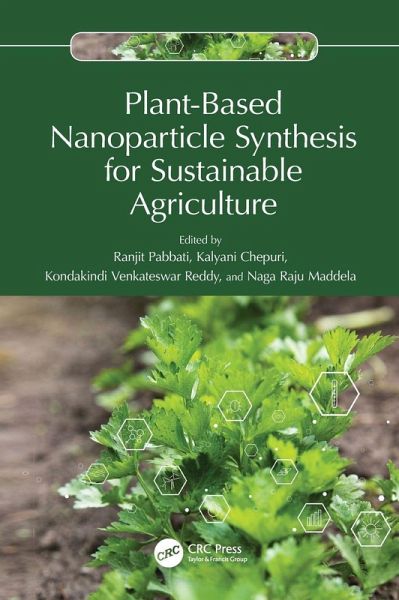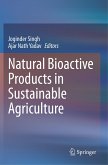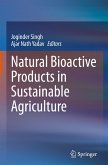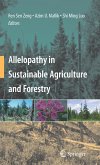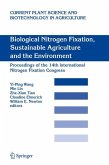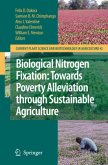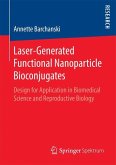Plant-Based Nanoparticle Synthesis for Sustainable Agriculture
Herausgeber: Chepuri, Kalyani; Pabbati, Ranjit; Raju Maddela, Naga; Reddy, Kondakindi Venkateswar
Plant-Based Nanoparticle Synthesis for Sustainable Agriculture
Herausgeber: Chepuri, Kalyani; Pabbati, Ranjit; Raju Maddela, Naga; Reddy, Kondakindi Venkateswar
- Gebundenes Buch
- Merkliste
- Auf die Merkliste
- Bewerten Bewerten
- Teilen
- Produkt teilen
- Produkterinnerung
- Produkterinnerung
Gives in-depth information on the plant-based synthesis of nanoparticles and promotes sustainable agriculture. It critically reviews nanomaterials synthesized from plants and their potential applications including nano-sized insecticides, herbicides, fungicides, fertilizers, and sensors to enhance crop productivity and improve soil health.
Andere Kunden interessierten sich auch für
![Natural Bioactive Products in Sustainable Agriculture Natural Bioactive Products in Sustainable Agriculture]() Natural Bioactive Products in Sustainable Agriculture110,99 €
Natural Bioactive Products in Sustainable Agriculture110,99 €![Natural Bioactive Products in Sustainable Agriculture Natural Bioactive Products in Sustainable Agriculture]() Natural Bioactive Products in Sustainable Agriculture110,99 €
Natural Bioactive Products in Sustainable Agriculture110,99 €![Environmentally Sustainable Primary Care Environmentally Sustainable Primary Care]() Environmentally Sustainable Primary Care213,99 €
Environmentally Sustainable Primary Care213,99 €![Allelopathy in Sustainable Agriculture and Forestry Allelopathy in Sustainable Agriculture and Forestry]() Allelopathy in Sustainable Agriculture and Forestry147,99 €
Allelopathy in Sustainable Agriculture and Forestry147,99 €![Biological Nitrogen Fixation, Sustainable Agriculture and the Environment Biological Nitrogen Fixation, Sustainable Agriculture and the Environment]() Yi-Ping Wang / Min Lin / Zhe-Xian Tian / Claudine Elmerich / William E. Newton (eds.)Biological Nitrogen Fixation, Sustainable Agriculture and the Environment166,99 €
Yi-Ping Wang / Min Lin / Zhe-Xian Tian / Claudine Elmerich / William E. Newton (eds.)Biological Nitrogen Fixation, Sustainable Agriculture and the Environment166,99 €![Biological Nitrogen Fixation: Towards Poverty Alleviation through Sustainable Agriculture Biological Nitrogen Fixation: Towards Poverty Alleviation through Sustainable Agriculture]() Biological Nitrogen Fixation: Towards Poverty Alleviation through Sustainable Agriculture147,99 €
Biological Nitrogen Fixation: Towards Poverty Alleviation through Sustainable Agriculture147,99 €![Laser-Generated Functional Nanoparticle Bioconjugates Laser-Generated Functional Nanoparticle Bioconjugates]() Annette BarchanskiLaser-Generated Functional Nanoparticle Bioconjugates37,99 €
Annette BarchanskiLaser-Generated Functional Nanoparticle Bioconjugates37,99 €-
-
-
Gives in-depth information on the plant-based synthesis of nanoparticles and promotes sustainable agriculture. It critically reviews nanomaterials synthesized from plants and their potential applications including nano-sized insecticides, herbicides, fungicides, fertilizers, and sensors to enhance crop productivity and improve soil health.
Hinweis: Dieser Artikel kann nur an eine deutsche Lieferadresse ausgeliefert werden.
Hinweis: Dieser Artikel kann nur an eine deutsche Lieferadresse ausgeliefert werden.
Produktdetails
- Produktdetails
- Verlag: Taylor & Francis Ltd
- Seitenzahl: 324
- Erscheinungstermin: 13. März 2025
- Englisch
- Abmessung: 254mm x 178mm
- ISBN-13: 9781032762531
- ISBN-10: 1032762535
- Artikelnr.: 71850665
- Herstellerkennzeichnung
- Libri GmbH
- Europaallee 1
- 36244 Bad Hersfeld
- gpsr@libri.de
- Verlag: Taylor & Francis Ltd
- Seitenzahl: 324
- Erscheinungstermin: 13. März 2025
- Englisch
- Abmessung: 254mm x 178mm
- ISBN-13: 9781032762531
- ISBN-10: 1032762535
- Artikelnr.: 71850665
- Herstellerkennzeichnung
- Libri GmbH
- Europaallee 1
- 36244 Bad Hersfeld
- gpsr@libri.de
Ranjit Pabbati has received a BTech (2003-2007), MTech (2007-2009), and PhD in biotechnology from Jawaharlal Nehru Technological University, Hyderabad, India. His research focuses on the area of medicinal plant biotechnology for the evaluation of antimicrobial activity on various pathogenic bacteria and antioxidant activity. He also works to understand secondary metabolite biosynthesis pathways for the mapping of genes involved in antimicrobial activity via transcriptome analysis using next- generation sequencing techniques. He has 14 years of teaching and mentoring experience, teaching both undergraduate and postgraduate students. He has received an internal grant from the Technical Education Quality Improvement Programme of the Government of India (TEQIP), working in the area of plant biotechnology. Currently, he is an assistant professor at the Centre for Biotechnology, University College of Engineering and Science and Technology, Jawaharlal Nehru Technological University, Hyderabad, Telangana, India. He has published 25 book chapters with various publishers, two books, 25 research papers, and three review articles in reputed journals. He has one patent for design from the Indian Patent Agency (2023). Kalyani Chepuri received her PhD from the Faculty of Biotechnology at Jawaharlal Nehru Technological University, Hyderabad, India, in 2018. Her postgraduate studies in biotechnology also include an MTech (2005-2008) and MSc (2003-2005) from the same institution. Her PhD research focused on the importance of phytochemicals taken from medicinal and dietary sources in cancer treatments, using combination therapy approaches that combine phytochemicals with chemotherapeutic drugs. She has 15 years of teaching experience with postgraduate students and has overseen the dissertation work of many postgraduate students. She served as a consultant for a variety of faculty development programs, conferences, value-added courses, and workshops. In 2020, she received Elite Gold certification for the Faculty Development Programme conducted by NPTEL, the Government of India. She has played a key role in the development of research grants for several research projects supported by the Department of Science and Technology (DST), Department of Biotechnology (DBT), and Technical Education Quality Improvement Programme (TEQIP). She has 25 peer-reviewed national and international journal papers to her name, as well as 15 book chapters. She has two patents for design from the Indian Patent Agency (2023 and 2024). She was awarded Telangana Associate Fellow for 2023 from Telangana Academy of Sciences, Government of Telangana, India. She is currently an assistant professor at the Centre of Biotechnology at Jawaharlal Nehru Technological University, Hyderabad, India. Kondakindi Venkateswar Reddy received his MSc in microbiology (2006-2008) from Sri Krishnadevyaraya University, Anantapur, Andhrapradesh, and received his MTech in environmental management and PhD (2017) in environmental science and technology from Jawaharlal Nehru Technological University, Hyderabad, Telangana, India. During his doctoral program in the area of industrial microbiology, he worked on the isolation, characterization, and molecular identification of cellulase-producing bacterial isolates used in aquaculture wastewater treatments. He has been working as a faculty member in microbiology and biotechnology for the past 15 years, teaching undergraduate and postgraduate students. His forte is industrial microbiology, biotechnology, and environmental management. He has successfully completed four AICTE-approved faculty development programs in the areas of applied environmental microbiology, experimental biotechnology, biochemistry, and cell biology. He has published 30 book chapters and two books, as well as 35 research papers and three review articles in reputed journals. He is also an active reviewer for prestigious publishers. He has actively participated in 25 national and international conferences and presented various research papers at prestigious universities. He has one patent for design from the Indian Patent Agency (2023). Currently, he is an assistant professor at the Center for Biotechnology, University College of Engineering and Science and Technology, Jawaharlal Nehru Technological University, Hyderabad, Telangana, India. Naga Raju Maddela received his MSc (1996-1998) and PhD (2012) in microbiology from Sri Krishnadevaraya University, Anantapuramu, India. During his doctoral program in the area of environmental microbiology, he investigated the effects of industrial effluents and insecticides on soil microorganisms and their biological activity. He has been working as a faculty member in microbiology since 1998, teaching undergraduate and postgraduate students. He also worked as a Prometeo Investigator (fellowship received from SENESCYT) at Universidad Estatal Amazonica, Ecuador, from 2013 to 2015 and received a postdoctoral fellowship (2016-2018) from Sun Yat- Sen University, China. He also received external funding from the China Postdoctoral Science Foundation in 2017 and internal funding from the Universidad Tecnica de Manabi in 2020. He has participated in national and international conferences and presented research papers in China, Cuba, Ecuador, India, and Singapore. Currently, he is a full professor at the Facultad de Ciencias de la Salud, Universidad Tecnica de Manabi, Portoviejo, Ecuador. He has been actively publishing scientific articles, books (authored and edited), and chapters since 2007. At the time of writing, he has published 110 articles, 25 books, and 50 book chapters.
Section I: Plant nanoparticle synthesis and applications. 1. Editorial
overview of nanotechnology in plant sciences. 2. Plant-based nanoparticle
synthesis. 3. Current developments in the synthesis of nanoparticles using
plant extracts. 4. Nanoparticles in plant transformation. 5.
Nanomaterial-mediated plant gene transformation for genetically modified
plants. 6. Nanoparticle update, translocation, and biological impacts in
plants. 7. Green nanoparticles used in agriculture to reduce ROS and
increase plant resilience to abiotic stress. 8. Mobility of nanoparticles
in plants. 9. Molecular mechanisms of plant nanoparticle interactions. 10.
Nanoparticle phytotoxicity. Section II: Nanoparticles in an agroecosystem.
11. Implications of nanotechnology on environmental remediation. 12. Green
synthesised mineral nano-fertilizers for plant growth promotion. 13.
Nano-fertilizers for plant growth and environmental sustainability. 14.
Role of nanoparticle-integrated biosensors for soil-plant systems. 15.
Nano-assisted abiotic remediation of contaminated soils. 16. Agro-nano
techniques for nutrient availability in plants. 17. Green nanotechnology:
Harnessing plant-based nanoparticles for sustainable food preservation. 18.
Green synthesized nanoparticles: A sustainable shield for food packaging.
19. Nano-infused functional foods: Redefining nutrition and health
paradigms. 20. Challenges and future direction of nanotechnology in plant
sciences.
overview of nanotechnology in plant sciences. 2. Plant-based nanoparticle
synthesis. 3. Current developments in the synthesis of nanoparticles using
plant extracts. 4. Nanoparticles in plant transformation. 5.
Nanomaterial-mediated plant gene transformation for genetically modified
plants. 6. Nanoparticle update, translocation, and biological impacts in
plants. 7. Green nanoparticles used in agriculture to reduce ROS and
increase plant resilience to abiotic stress. 8. Mobility of nanoparticles
in plants. 9. Molecular mechanisms of plant nanoparticle interactions. 10.
Nanoparticle phytotoxicity. Section II: Nanoparticles in an agroecosystem.
11. Implications of nanotechnology on environmental remediation. 12. Green
synthesised mineral nano-fertilizers for plant growth promotion. 13.
Nano-fertilizers for plant growth and environmental sustainability. 14.
Role of nanoparticle-integrated biosensors for soil-plant systems. 15.
Nano-assisted abiotic remediation of contaminated soils. 16. Agro-nano
techniques for nutrient availability in plants. 17. Green nanotechnology:
Harnessing plant-based nanoparticles for sustainable food preservation. 18.
Green synthesized nanoparticles: A sustainable shield for food packaging.
19. Nano-infused functional foods: Redefining nutrition and health
paradigms. 20. Challenges and future direction of nanotechnology in plant
sciences.
Section I: Plant nanoparticle synthesis and applications. 1. Editorial
overview of nanotechnology in plant sciences. 2. Plant-based nanoparticle
synthesis. 3. Current developments in the synthesis of nanoparticles using
plant extracts. 4. Nanoparticles in plant transformation. 5.
Nanomaterial-mediated plant gene transformation for genetically modified
plants. 6. Nanoparticle update, translocation, and biological impacts in
plants. 7. Green nanoparticles used in agriculture to reduce ROS and
increase plant resilience to abiotic stress. 8. Mobility of nanoparticles
in plants. 9. Molecular mechanisms of plant nanoparticle interactions. 10.
Nanoparticle phytotoxicity. Section II: Nanoparticles in an agroecosystem.
11. Implications of nanotechnology on environmental remediation. 12. Green
synthesised mineral nano-fertilizers for plant growth promotion. 13.
Nano-fertilizers for plant growth and environmental sustainability. 14.
Role of nanoparticle-integrated biosensors for soil-plant systems. 15.
Nano-assisted abiotic remediation of contaminated soils. 16. Agro-nano
techniques for nutrient availability in plants. 17. Green nanotechnology:
Harnessing plant-based nanoparticles for sustainable food preservation. 18.
Green synthesized nanoparticles: A sustainable shield for food packaging.
19. Nano-infused functional foods: Redefining nutrition and health
paradigms. 20. Challenges and future direction of nanotechnology in plant
sciences.
overview of nanotechnology in plant sciences. 2. Plant-based nanoparticle
synthesis. 3. Current developments in the synthesis of nanoparticles using
plant extracts. 4. Nanoparticles in plant transformation. 5.
Nanomaterial-mediated plant gene transformation for genetically modified
plants. 6. Nanoparticle update, translocation, and biological impacts in
plants. 7. Green nanoparticles used in agriculture to reduce ROS and
increase plant resilience to abiotic stress. 8. Mobility of nanoparticles
in plants. 9. Molecular mechanisms of plant nanoparticle interactions. 10.
Nanoparticle phytotoxicity. Section II: Nanoparticles in an agroecosystem.
11. Implications of nanotechnology on environmental remediation. 12. Green
synthesised mineral nano-fertilizers for plant growth promotion. 13.
Nano-fertilizers for plant growth and environmental sustainability. 14.
Role of nanoparticle-integrated biosensors for soil-plant systems. 15.
Nano-assisted abiotic remediation of contaminated soils. 16. Agro-nano
techniques for nutrient availability in plants. 17. Green nanotechnology:
Harnessing plant-based nanoparticles for sustainable food preservation. 18.
Green synthesized nanoparticles: A sustainable shield for food packaging.
19. Nano-infused functional foods: Redefining nutrition and health
paradigms. 20. Challenges and future direction of nanotechnology in plant
sciences.

